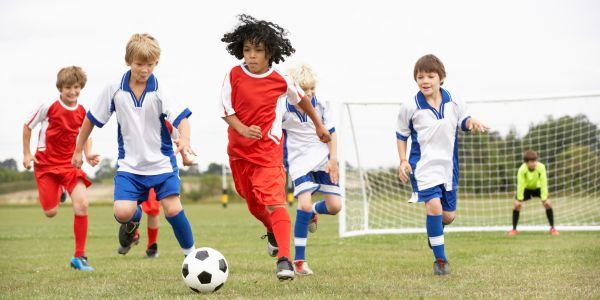Train Your Mind to Respond Well to Adversity
This is something young athletes can achieve, but it takes practice. It doesn’t necessarily come naturally.
Young athletes need to train their brains to respond automatically to challenging situations.
To do this, they should consistently tell themselves positive, empowering messages. If they don’t actively train their brains, they will inadvertently train their brains passively.
That means that whatever messages pop into their minds will affect their performance, whether the messages are positive or negative.
For example, if your athletes haven’t actively trained their brains, and a referee or official blows a call, their mental response may be, “This always happens to me. The officials are out to get me.
The officials are favoring the other team.” This negative response could cause kids to become frustrated and angry. They won’t be able to focus, and will make more mistakes.
In this example about referees’ calls, kids can train their brains to respond with mental toughness. Of course, this requires practice. They should tell themselves, “No matter what the official does, it doesn’t matter. I can handle anything.”
If young athletes consistently tell themselves empowering messages, they will respond with mental toughness automatically.
The best way for kids to train their brains to handle adversity is to learn to cope with adverse conditions in practice and respond positively. In other words, they should respond the way they should react in competitions
Help young athletes understand that they control how they deal with adversity.
They should anticipate challenges and be ready to respond with positivity.
For example, if sports kids want to play hard when they are tired during competitions, they can train their brains by pushing themselves hard at the end of practice.
They should focus on strong messages by telling themselves, “I will outwork everyone at the end of practice. I will work hard until the very last second. Nothing can stop me.” The key is for kids to actively focus on mental skills.
To do this, young athletes can imagine challenging scenarios they might experience during games. They can then imagine–or visualize–how they would cope with those experiences, such as going into the game cold on short notice.
Visualization is not always about mentally rehearsing a peak-level performance. It’s important to also visualize challenging situations.
Help kids start by thinking about what might be challenging for them during a game. An interception? Missing a tackle? Harsh weather conditions?
Next, ask kids how they would cope with each challenging situation. They need to prepare by training their brains to react in positive ways. Again, the idea is to prepare themselves to respond automatically.
Related Articles on Youth Sports:
- Playing Through Adversity
- How This Olympian Overcame Adversity After Almost Losing Both Legs
- Help Sports Kids Grow From Adversity
*Subscribe to The Sports Psychology Podcast on iTunes
*Subscribe to The Sports Psychology Podcast on Spotify
The Composed Sports Kid

“The Composed Sports Kid” audio and workbook digital download program for young athletes and their parents or coach helps kids cope with frustration and anger in sports. Help your sports kids learn how to manage expectations and let go of mistakes so they can keep their head in the game.
The Composed Sports Kid system is really two programs in one–one program to train parents and coaches how to help their kids practice composure, and one program that teaches young athletes–ages 6 to 13–how to improve composure, let go of mistakes quickly, have more self-acceptance, and thus enjoy sports more!

